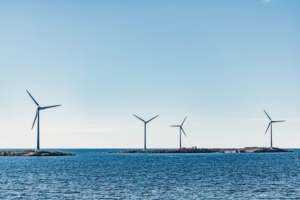Alec Haglund, IF Researcher, argues that instead of appealing to the fossil fuel industry with the promise of more fracking and drilling in the North Sea, the new government should take this opportunity to massively invest in renewable energy sources.

A crisis on many fronts
As we are facing an unprecedented cost-of-living emergency as well as an energy crisis, bold moves are required from the new Prime Minister in order to urgently lower bills and ensure a secure, cheap and clean energy supply in the future. An estimated 45 million people, or two-thirds of UK households, will face fuel poverty by January 2023 without immediate action from the government.
Before the massive impact of energy bills squeezing disposable incomes further, the UK was already facing a cost-of-living crisis and a fall in real wages not witnessed in many decades. The majority of young people and low- and middle-income workers were already forced to spend over two-thirds of weekly expenditure on essential spending before the COVID-19 pandemic and the cost-of-living crisis, and their disposable incomes are now being pushed to the limit.
Aside from external factors, the UK energy crisis is in part due to the reliance on fossil fuels for heating and electricity. It is expensive to produce electricity from gas (a fossil fuel) when electricity can be produced up to nine times cheaper by wind power, which is a clean energy source. When viewed in conjunction with the fact that the UK has the least energy efficient homes in Western Europe, it is easy to understand why the energy crisis hits the UK especially hard.
Short-, medium- and long-term solutions
Short, medium- and longer-term solutions are necessary for the energy crisis not to become a recurring problem that younger and future generations must face. Of course, people need and deserve immediate help from the government. However, the £130 billion the new government is expected to borrow to keep energy bills from hitting the most obscene levels predicted, disproportionately benefits wealthier and older people if not implemented in a progressive way. Nor does it solve the underlying structural problems with the energy system.
There are fairer and more progressive ways to deliver cheaper, cleaner energy for the nation. By introducing a progressive payment scheme for energy bills, similar to that of the tax system – where lower-income households would pay a much smaller share per unit of energy than wealthier households – immediate help would be provided to low-income households. This policy has the support of the UK’s third-largest energy supplier, OVO Energy.
In order to avoid the energy crisis from becoming a source of intergenerational injustice through the regressive means of passing on the cost to already-burdened young and low- and middle-income earners, solutions must be made from a long-term and intergenerational perspective.
Taking on debt to insulate homes and invest in building renewable energy production would be a fiscally responsible debt that future generations would benefit from in the long-term, both in terms of a secure and clean energy supply as well as a step towards avoiding ecological breakdown.
The energy crisis is connected to the climate crisis
It appears that the new government might attempt to use the energy crisis as an excuse to further entrench fossil fuels in our energy system by awarding 130 new offshore drilling licenses as well as increasing fracking. Fracking is a notoriously environmentally destructive and expensive way of producing energy, while production from new offshore drilling would only produce results after a quarter of a century, at best.
Neither proposal would do anything to overcome the current energy crisis. Instead, they would accelerate the pace towards full climate breakdown, while rewarding shareholders of fossil fuel companies who are already seeing record profits.
Build more solar and wind
Rather than taking on debt merely to subsidise energy giants with public funds, more investment must be allocated to improve energy efficiency and build solar and wind farms, both of which can be delivered quickly. We must also invest into improving our energy grid and storage capabilities, ensuring that future generations have an energy system fit for purpose.
The rate at which homes have been upgraded to an energy efficiency rating of Band C or above have fallen by around 90% over the past decade. Insulating homes is a cost-effective way of reducing energy bills both in the short- and long-term, while simultaneously reducing overall energy use.
There are also further knock-on costs to society if we do not ensure that everyone has access to affordable energy. These include: social exclusion; poorer educational attainment by children left to freeze in cold homes; and long-term health effects. In economic terms, the cost to the NHS for the treatment of illnesses caused by living in cold or damp homes was estimated to be at least £2.5 billion in 2019, well before the current energy crisis.
Never let a crisis go to waste
As horrible as the squeeze on living standards will be for younger people and those on lower incomes, the energy and cost-of-living crisis simultaneously presents us with an opportunity to radically rethink and reshape our energy system.
We must use this moment to argue for the right to affordable energy, as many young and low- and middle-income earners already struggled to pay the bills before the energy crisis. We must also emphasise that the energy crisis is inextricably intertwined to the wider climate crisis, and that if we are serious about reaching Net Zero, now is the time to massively shift investment towards renewable energy production.
Help us to be able to do more
Now that you’ve reached the end of the article, we want to thank you for being interested in IF’s work standing up for younger and future generations. We’re really proud of what we’ve achieved so far. And with your help we can do much more, so please consider helping to make IF more sustainable. You can do so by following this link: Donate
